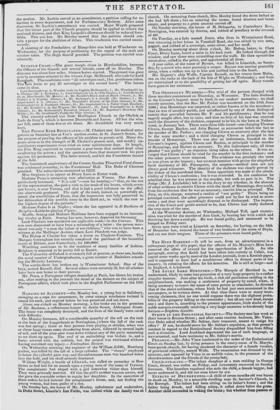STEEPLE CnAsk.—The great steeple chase in Hertfordshire, between the Officers
of the Guards and several friends, came off on Monday. The distance was about four miles. Sixteen horses started. The ground was gone over in seventeen minutes by the winner, Capt. McDonnell, who rode for Lord Ranelagh. The conditions were "25 sovereigns each, list, gentlemen riders. The test horse to pay 25 sovereigns' to the second horse." The horses came in thus.
Lord Ranelagh's gr. h. Wonder (rode by Captain McDonnell), I; Mr. Wombwell's by. Is. Thomas (Mr. A. Berkeley), 2; Lord Clanricadesh. h.'(The Owner), 3; Lord Belfast's ch. m. Miss Doodle (Mr. if aines), 4; Mr. Nesbitt's Black-and-all-Black (Owner), 5 ; Mr. Cosby's b. h. Gimblet (Owner), 6; Mr. Bulkeley's b. h. Giraffe (Mr. Stubbs), 7 ; Mr. Angerstein's b. h. (Owner), 8 ; Mr. Thornhill's Peveril of the Peak (Owner), 9; Mr. Codrington's br. h. Topthorn (Owner), 10; Mr. Angerstein's b. h. Tatter (Capt. Beecher), 11; Mr. Nesbitt's b. m. Bet Wagnor (Mr. Kenlock), 12; Lord Ranelagh's by. h. Bully (Owner), 13; Mr. Rothschild's President (Owner), 14; Mr. Bayntun s Mowbray (Mr. White), ; Mr. Strathfield's Teddy the Tiler (Owner), 16. The country selected was from Harlington Church to the Obelisk at Lady de Grey's, which is between Dunstable and Luton. All but the win- ner fell, some of them five or six times. Mr. Strathfield was very much hurt.
Tim Potsos Knee REINSTATED.—M. Chabert met his medical anta- gonists on Saturday last at Cox's auction-rooms, in St. James's Street, for
the purpose of proving the efficacy of his antidote to prussic acid. Many dis- putes arose as to the strength of M. Chabert's prussic acid, and sundry un- satisfactory experiments were tried on some unfortunate dogs. At length, the Fire King contrived to reanimate a poor brute that seemed dead after swallowing the poison ; and the spectators from that moment took his part against his persecutors. The latter retired, and left the Frenchman master of the field.
The fourteenth anniversary of the Covent Garden Theatrical Fund dinner was celebrated yesterday, in the Freemasons' Hall. The Duke of Clarence presided. The subscription amounted to 1223/. 3liss Stephens is to appear at Drury Lane in Easter week.
Madame Pasta is attracting vast admiration at Vienna. Her Romeo is particularly instanced. "It is said "—now for humbug—" that, on the eve of the representation, she paid a visit to the tomb of the lovers, which, every one knows, is near Verona, and that it had a great influence on the effect she afterwards produced. 7'1e sight of the tomb, indeed, so powerfully af-
fected the sensibilities of Pasta, that the impression was fully preserved in her delineation of the terrible scene in the third act, in which she rose to the highest degree of the pathetic."
Madame Fodor is at Naples ; where she has appeared in R Barbiere di Siriglia-1.4thlache playing Figaro.
3iadile. Sontag and Madame 3Ialibran have been engaged in an interest- ing rivalry at Paris. Sontag has now, however, departed for Germany.
Lord Plunkett was murdered one night this week—in the Courier. This was soon discovered to have been a misreading of a letter : the person mur- dered was only " a man the father of ten children," who was to have been a witness at the Mullingar Assizes, where Lord Plunkett was judge.
The Bishop of Chester has taken a house on Clapham Common. The Marquis Conyngham has recently completed the purchase of the beautiful estate of Bifrons, near Canterbury, for 100,0001.
Worthing continues to be the residence of many families of fashion. Brighton is expected to be pretty full at Easter. The University of Oxford is extremely full at present, as there are, besides the usual number of Undergraduates, a great number of Bachelors attend- ing the Divinity Lectures.
The scarlet-fever has broken out in Westminster School. One of the boys, named Russell, died. Several others were seriously ill, but all scholars have been sent home to their parents.
Mr. Praca, a Portuguese refugee domiciled at Paris, has blown his brains out, after reading in the journals the detail of the debates on the subject of Portuguese affairs, which took place in the English Parliament on the 18th


















 Previous page
Previous page